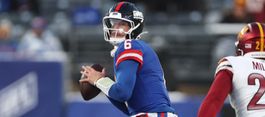Many view fantasy football and sports betting as two exclusive entities. And while these are both unique ways to get involved in weekly NFL action, there’s more overlap between the two than you might think.
At their cores, both fantasy football and betting involve predicting outcomes. In fantasy, we try to predict individual player performance when we set out weekly lineups. In betting, the focus is more on broader team performance, but that’s starting to shift with the emergence of more individual player prop wagers.
Most importantly, we can use the odds sportsbooks put out to help us make lineup decisions. In this piece, I’ll break down a few ways you can use the wise guys to your advantage.
Check out BettingPros Premium: Get access to the best sports betting tools and insights ![]()
Use the spread to predict game script
Let’s start with perhaps the most widely known term in the sports betting vernacular, the spread. This is a number used by sportsbooks to even the odds between two unevenly matched teams. The spread is an indicator of how many points a team is favored over another.
For instance, the Baltimore Ravens are -7 against the New York Jets in Week 1. That means the Ravens are viewed as a full touchdown better than the Jets. To “cover,” the spread, Baltimore needs to win by at least eight points on the road.
So how do we translate the spread into our fantasy football analysis? We can use it to get an idea of what the game script could look like. And as we know, the game script can be vital in a player’s usage and fantasy success.
Let’s use the Ravens-Jets game again. With a spread of Baltimore -7, the expectation is that the Ravens will likely be in control and leading most of the game. That means it’s more likely we see an already run-heavy Ravens offense go to the ground more often later in the game to protect their lead. That means there could be more carries for J.K. Dobbins and Lamar Jackson, but fewer pass attempts from Jackson to Rashod Bateman and Mark Andrews.
On the flip side, as 7-point underdogs, the Jets may have to throw more to keep up with the heavily-favored Ravens. That could be good news for receivers Elijah Moore, Garrett Wilson, and Corey Davis, but might result in fewer touches for Breece Hall and Michael Carter.
The point spread isn’t gospel, especially in the NFL, but it can help us get a better sense of game script and player workloads.
Factor totals into start/sit decisions
Now let’s talk about the over/under, otherwise known as the total. Betting on the total is simply betting on how many points you expect to be scored in a game. You can also bet on individual team totals too. That same Jets-Ravens game has a total of 44.5 points. If you bet the over, you think there will be at least 45 points scored. Whereas an under bet means you expect the game to end with a final score of 44 combined points or fewer.
We can use the over/under to get a sense of which games are expected to be higher scoring. Higher scoring games naturally deliver more touchdowns and better fantasy performances.
For instance, say you are torn between Cleveland’s Amari Cooper and Arizona’s Marquise Brown as your WR2 in Week 1. Both are their team’s No. 1 receiver and face relatively equal matchups in terms of opposing secondaries. Tough decisions like this are where the total can come in handy.
The current total for the Browns-Panthers game is 41.5 points, tied for the lowest total of Week 1. Meanwhile, the total in the Cardinals-Chiefs game is 53.5, the highest total on the board. In essence, sportsbooks are expecting Arizona-K.C. to have much more scoring than a potential rock fight between Cleveland and Carolina. This information could help persuade you to start Brown more confidently.
The same exercise can be conducted by using individual team totals. Let’s use another example. Say you’re deciding between JuJu Smith-Schuster and Elijah Moore for a starting spot. Kansas City’s team total is 28.5 points, while New York’s is 17.5. Oddsmakers expect K.C. to score more, which could yield more opportunities for Smith-Schuster.
Point totals can be a handy tool when comparing upside amongst your players.
Use player props as projections
Finally, let’s talk about the emerging player prop markets. This type of wager is gaining popularity, and it could be the most tangible way to compare players when setting your lineup.
A player prop is much like a point total, except it looks at individual player stats. Like the total, you can bet whether the player will finish over or under their respective prop. There are prop bets for pretty much every statistical category for quarterbacks and skill position players. You can bet on touchdowns, receptions, yardage, even rush attempts and so much more.
We can use player prop odds exactly like the projections our respective fantasy providers put out each week. For example, if Vegas odds list Elijah Moore’s yardage total at 68.5, while Smith-Schuster’s is at 80.5 yards, this suggests that JuJu could be in store for the bigger day.
They call oddsmakers “wise guys,” for a reason, so don’t be afraid to factor their projections into your fantasy football lineup decisions.
New customers kick off Week 1 with $150 in Free Bets at FanDuel Sportsbook ![]()
Subscribe: Apple Podcasts | Spotify | Google Podcasts | Stitcher | SoundCloud | iHeartRadio
If you want to dive deeper into fantasy football, be sure to check out our award-winning slate of Fantasy Football Tools as you navigate your season. From our Start/Sit Assistant – which provides your optimal lineup based on accurate consensus projections — to our Waiver Wire Assistant — which allows you to quickly see which available players will improve your team and by how much — we’ve got you covered this fantasy football season.








